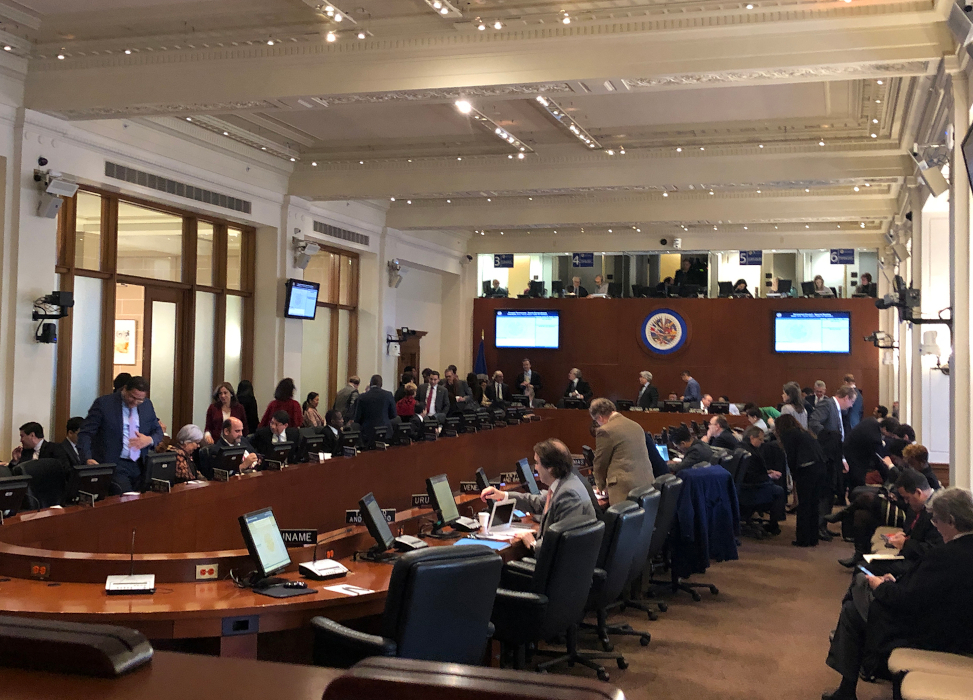
Diplomats and international representatives of the Organization of American States meet in Washington Jan. 11, 2019, to consider whether to take diplomatic action against the Central American country of Nicaragua as it spirals into political turmoil. The U.S. State Department has issued its annual "country reports" on human rights. (CNS/Rhina Guidos)
The State Department issued its annual country reports on human rights March 11, highlighting abuses in China, Myanmar, Vietnam and other nations during a press briefing that day.
"China is spreading features of its authoritarian system to the world, such as restrictions on civil society and freedom of expression, and the use of invasive high-tech surveillance to track and monitor citizens," said Robert Destro, assistant secretary of state.
"The absence of an independent judiciary and the government's tight controls on information increasingly make it difficult for lawyers and activists to defend the rights of the Chinese people," said Destro, formerly dean of the law school at The Catholic University of America, Washington.
"We remain deeply concerned about the Chinese Communist Party's brutal campaign of repression in Xinjiang, including mass detentions in internment camps, pervasive high-tech surveillance, draconian controls on expressions of cultural and religious identity, and coercion of individuals to return from abroad to an often-perilous fate," he added.
In Myanmar, formerly known as Burma — the State Department uses the latter name — "extreme repression and systematic discrimination against members of the minority Rohingya population, who are predominantly Muslim, continued in Rakhine state. The international community has stood together to firmly condemn the ethnic cleansing of Rohingya, Destro said.
"The United States has repeatedly expressed our deep concern about the widespread violence committed by elements of the Burmese military, security forces, and local vigilantes and matched this concern with action, including sanctioning the commander-in-chief and other top military officials for their roles in serious human rights abuses," he added.
"Preventing further atrocities, addressing the needs of victims, and ensuring accountability for those responsible are essential to resolving this crisis and advancing Burma's transition to a peaceful democratic state."
"There has been some progress" in Vietnam, said Scott Busby, a State Department official in the Bureau of Democracy, Human Rights, and Labor who conducts an annual dialogue with his Vietnamese counterparts on human right issues. "On the rights of disabled persons, Vietnam is doing better. On respect for the rights of LGBTI persons, they've made some progress. And when it comes to labor reform and religious freedom, we've also seen some progress."
Busby added, "We still remain very concerned about the trend in Vietnam of arresting people who freely express their opinion, people who criticize the government. And we raised those concerns at the dialogue, including calling for the release of individual cases."
The United States managed to secure the release of one dissident, "and she is now safely in the United States," Busby said. "We were sad at the fact that she had to leave her country in order to become free, but we are happy that she's now free."
Destro criticized Venezuela and Nicaragua's lack of human rights progress.
"We've not seen any human rights improvements in Venezuela. There were continued reports of police abuse and involvement in crime, particularly in the activities of illegally armed groups as well as illegal and arbitrary detentions, extrajudicial killings, kidnapping and the excessive use of force," Destro said.
"Disdain for democracy and human rights under the dangerous authoritarian leadership of Nicolas Maduro has dramatically worsened the political, economic, and humanitarian crisis facing the country. The once-prosperous nation now faces severe shortages of food and medicine, and suffers from soaring inflation that has forced millions of Venezuelans to flee to neighboring countries."
In Nicaragua, "President Daniel Ortega continues to consolidate his power and erode democracy and respect for human rights in the country," Destro said.
"The regime cracks down brutally on all dissent. Hundreds of government critics, including journalists, students, and farmers, have been detained without due process and remain in prison under squalor conditions. We call on the Ortega regime to release its political prisoners and to restore democracy in Nicaragua."
In India, which revoked the special status of Kashmir last summer, locking down communications media and locking up an untold number of suspected dissidents, "we're waiting to see how the situation plays out. We've expressed our concern to the government of India," Destro said.
"But India is, by its own admission, the largest democracy in the world, and so we look forward to continuing our engagement with the Indian government, and we don't hesitate to make our position clear. We didn't like the idea that they shut down the internet, and we made that clear," he added.
He noted the late-winter violence in and around New Delhi following passage of a new citizenship law that could severely limit the rights of the nation's 200 million Muslims is not included in the report, as these incidents did not occur in 2019, the year covered by the 2020 report, and so would be part of next year's report.
Advertisement







